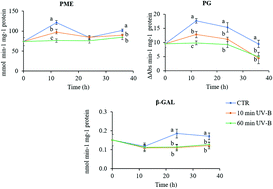Softening processes after ripening are a major factor contributing to the perishability of fleshy fruit and, together with mechanical damage, represent the onset of physiological decay. Softening involves multiple co-ordinated events leading to modifications of the cell wall architecture. Several studies described that UV-B radiation positively affects both the nutraceutical and aesthetical qualities of fruit. However, very few studies investigated the effect of UV-B irradiation on the activity of cell wall-related enzymes. This research aimed at studying how different UV-B treatments (10 min and 60 min) affect the activity of cell wall-modifying enzymes (pectin methylesterase, polygalacturonase and β-galactosidase) together with the expression of some of their isoforms up to 36 h after UV-B treatment of peach (cv. Fairtime, melting phenotype) fruit. Results revealed that UV-B radiation did not affect the soluble solid content and the titratable acidity, two important parameters influencing consumers’ choice and taste. In contrast, UV-B was effective at reducing the loss of firmness 24 h after the 60 min irradiation. Generally, a lower activity of the hydrolytic enzymes compared to untreated fruit was observed, regardless of the UV-B dose. However, gene expression did not reflect the corresponding enzymatic activity. Based on these results, UV-B irradiation might be a successful tool in reducing the loss of firmness of peach fruit during post-harvest, thus improving their quality and shelf-life.
